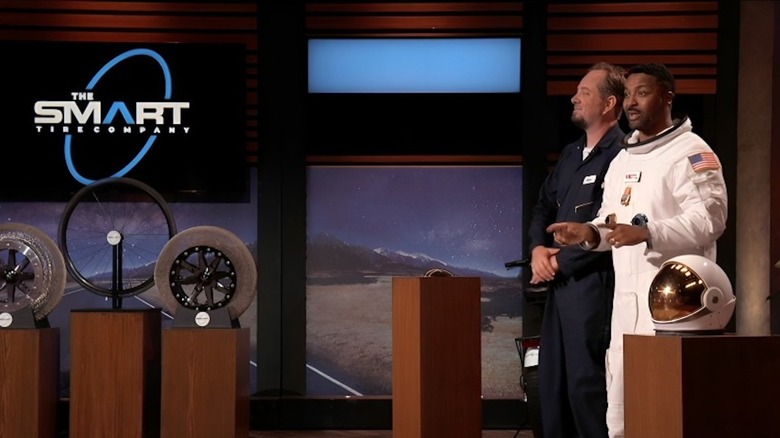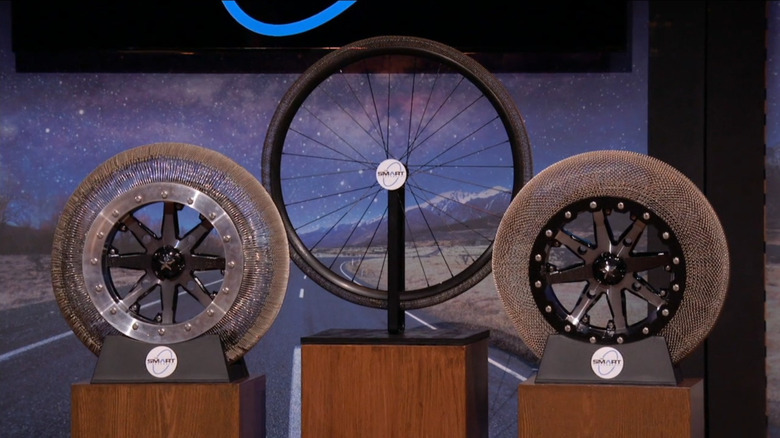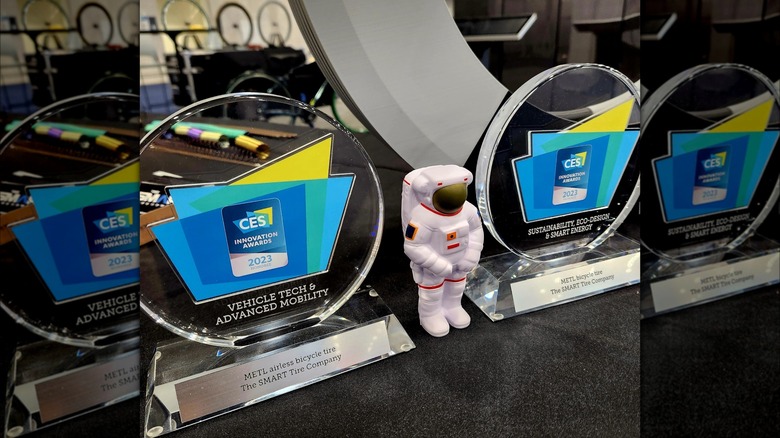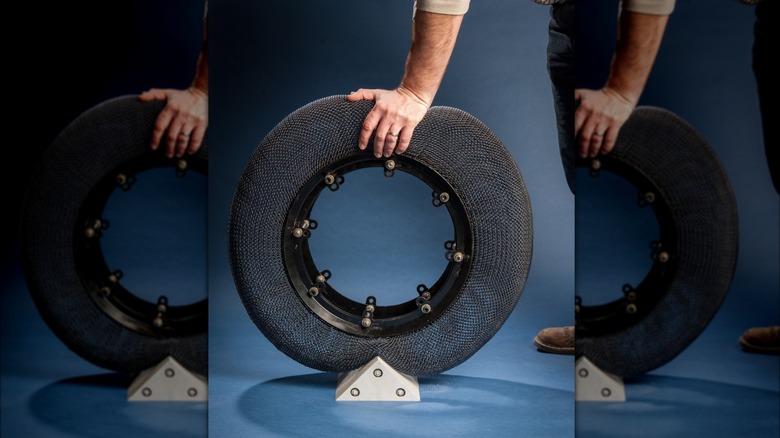What Happened To The SMART Tire Company From Shark Tank Season 13?
We may receive a commission on purchases made from links.
On Season 13, Episode 10 of "Shark Tank" in 2022, the founders of the SMART Tire Company (STC) appeared in an episode that guest starred comedian/entrepreneur Kevin Hart. Brian Yennie and Earl Cole aim to change the transportation industry by creating an airless tire from a space-aged material initially invented by NASA (STC's product shouldn't be confused with the SMARTwheel steering wheel cover that appeared in Season 4). Guest introductions are always fun to watch, and this was no exception. Yennie first rides into the tank on a scooter, while Earl follows on an electric bike wearing a full astronaut space suit, including the helmet. Their big entrance immediately piqued the Sharks' interest — even Kevin O'Leary seemed impressed.
Yennie started the presentation by claiming that seven conventional rubber tires fail every second in the United States and said the components generate some 50 billion pounds of toxic waste annually. Available data suggests that an estimated 2.5 billion tires are manufactured yearly, while 1 billion end-of-life tires (ELTs) are discarded in the same time frame. So it's clear that a more environmentally friendly alternative to the standard rubber tire brands is needed.
Their airless tire concept that never goes flat uses NiTinol+ (nickel titanium), a shaped memory alloy that NASA created in its reinvention of the wheel for its Mars rover. It's elastic like rubber and strong like titanium, allowing it to expand and contract rapidly, survive extreme deformation, then pop back to its original shape without losing integrity. Yennie and Cole might not own NiTinol+, but they've licensed the springy metal from NASA via a "Space Act Agreement" that allows them to use the technology.
Did the SMART Tire Company get a deal on Shark Tank?
Brian Yennie's and Earl Cole's big-vision pitch was "reimagining the wheel by reinventing the tire," and they were seeking $500,000 for a 2.5% stake in the company. Their first commercial product is METL, an airless bicycle tire meant for the fast-growing micromobility market, which Yennie claimed would allow them to eventually move into automobile tires. To get there though, they first needed to optimize their patent-pending solution that integrates NiTinol with rubber (the tires shown during the episode were in their raw form, without the elastic substance).
Mark Cuban pressed Yennie and Earl Cole for hard details about business operations and execution, but they couldn't provide him with any tangible plans. When Cole said they raised $1.3 million through equity crowdfunding, Cuban became very hesitant about the whole concept. Meanwhile, Kevin O'Leary wanted to know if the car tire was part of the deal they were trying to make, but despite their best efforts, Yennie and Cole couldn't satisfactorily explain the business model's functionality. Seeing blood in the water, the sharks all jumped in simultaneously, trying to get more details.
Yennie said NiTinol costed $150 a pound, and Kevin Hart, who was clearly lost in the weeds by the jargon, directly asked what the tires were going to cost. Yennie was reluctant, and when he finally gave them a retail price between $2,500 and $3,000, Cuban balked at the numbers. "No wonder you didn't want to tell us!" he said. Yennie eventually revealed that car tires would cost around $700 to $800 each, the typical price point for a high-performance model. Ultimately, none of the sharks invested in the company.
What happened to the SMART Tire Company after Shark Tank?
Brian Yennie and Earl Cole weren't deterred by the lack of interest from the sharks, as the SMART Tire Company (STC) is very much still in business. In fact, it has continued to earn rave reviews about its concepts. In 2023, it was selected as one of Time magazine's best inventions of the year, while its airless bicycle tire concept, METL, won two CES 2023 Innovation Awards in two different categories.
Verbiage on the company's website says it was aiming for a Q3 2024 release of METAL, which features re-treadable rubber treads that use 50% less rubber than standard bike tires, but it still hasn't been released. Additionally, it's still unclear how long it will be before it can get automobile tires to market, though they'll have the same airless (thus it will never go flat) re-treadable feature as the bike tire. Consumers will only have to replace the outer rubber tread when it wears out and get to keep the original NiTinol tire through the life of the vehicle.
According to available data, STC has run multiple crowdfunding campaigns on platforms like Wefunder, StartEngine, and Kickstarter since 2021, amassing far more than they were looking for when they appeared on "Shark Tank." Additionally, and perhaps more importantly, it still has the Space Act Agreement with NASA, which is constantly exploring new technologies. This not only gives the business an exclusive license to continue developing their tires but also provides it with access to engineers and scientists from NASA's Glenn Research Center in Ohio.
What's next for the SMART Tire Company?
The SMART Tire Company website says it has strategic partnerships with Felt Bicycles (a high-performance cycling brand), Spin (a leading micromobility company now owned by Bird Rides Inc.), and additional partnerships are reportedly in place with top aerospace firms and electric vehicle, AV, mining, and eVTOL companies. However, the business hasn't yet revealed who those partners are despite saying they were to be revealed "at some point in 2024."
That year, the company completed phase I research for the Environmental Protection Agency (EPA) to study the recyclability of NiTinol and other shape memory alloys. It also added another NiTinol manufacturer, which should provide cost-efficiency, faster lead times, and higher grades of shape memory alloys (SMA). STC won Hyundai Motor Group's Accelerate the Future Challenge and met with the CEO of both Hyundai and Kia, where they presented their tire concept to widespread praise. Adding another layer of credibility toward actually providing a car tire is the fact that their principal engineer is Jim Benzing, who spent over 40 years at Goodyear Tires and was the co-inventor of the Superelastic Tire.
STC's first initiative in 2025 was to get their airless bicycle tire METL to market. They also planned on establishing pilot programs with mobility fleets for their line of scooter tires, continuing the design and development of their space rover tire, collaborating more with Hyundai and Kia Motors, and entering a second phase of car tire development with top-tier tire manufacturers. Last but not least, the company plans on continuing to fundraise via private equity in preparation for going to market with scalable manufacturing.



